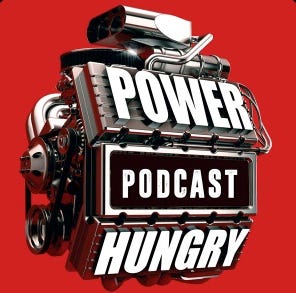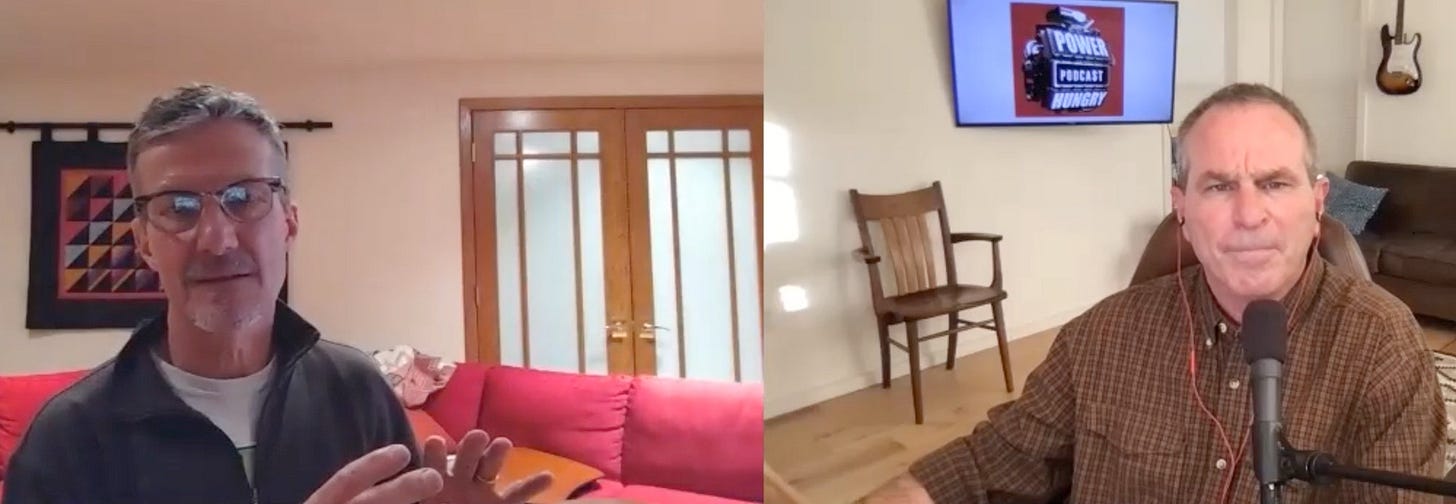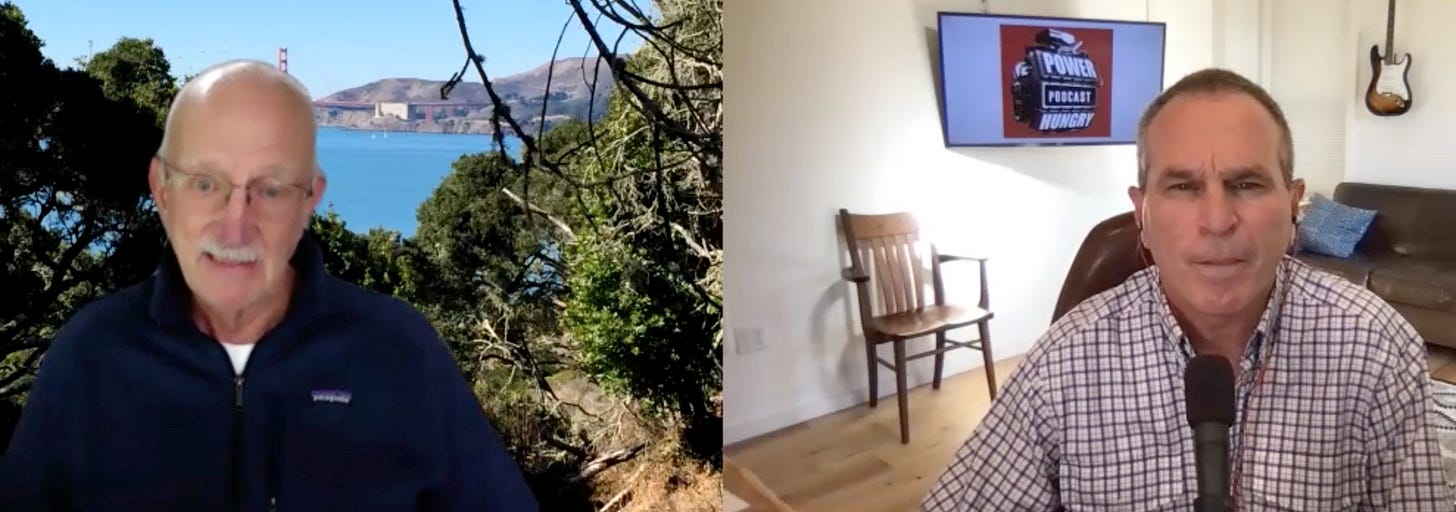Blackout autopsy has begun; podcasts, pandas, and a red-shouldered hawk
The autopsy of the Texas Blackouts will be gruesome, two new podcasts, media hits, and our resident red-shouldered hawk
The blame game has started.
In Austin, and around the country, politicians, journalists, and analysts are trying to determine who, or what, is responsible for one of the biggest blackouts in American history. While it is still early days, it’s apparent that Texas narrowly averted what would have been a catastrophic meltdown of its electric grid. Four items this week:
It's Blackout Week on the Power Hungry Podcast
Media hits
Our resident red-shouldered hawk
Note: I took the photo at the top of this note on the morning of Friday the 19th. It shows snow on part of our 8.5 kW solar array, which was pretty much worthless during the blackout.

On Tuesday, after many hours of reading articles and tweets about the blackout, I published another piece in Forbes that laid out some of the most important lessons so far from the Texas Blackouts. I wrote, "The autopsy of last week’s near-collapse of the Texas electric grid will be gruesome. The Texas Blackouts were the result of several complex and interrelated factors. The final cost of the blackouts will be measured in tens of billions of dollars and the blizzard of finger-pointing, litigation, and bankruptcies will last for years to come." I then laid out the key issues that I see, including these four:
We ignore the fragility of the electric grid at our peril. The Texas Blackouts are a stark reminder that the electric grid is our biggest, most important, and most complex network. Its strategic importance to our society cannot be overstated. The electric grid is the mother network, the network upon which all of our most-critical networks depend. We must pay more attention to its resilience and reliability.
The reason for the blackouts is simple: grid mismanagement. Last Wednesday, on the latest episode of the Power Hungry Podcast, I asked Meredith Angwin, the author of a terrific new book, Shorting the Grid: The Hidden Fragility of Our Electric Grid, a simple question: What happened? She quickly replied: “Grid mismanagement...The rules that set up the grid do not care about reliability.”
Electrifying everything is a recipe for disaster. As I wrote on this site last week, this blizzard shows that attempting to “electrifying everything” will reduce our society’s resilience and lead to what could be a catastrophic failure. In the simplest terms, attempting to electrify everything requires putting all of our energy eggs in a single basket, and that basket — the electric grid — has repeatedly demonstrated how fragile it can be. During a time when we should be laser-focused on increasing our society’s resilience to external shocks, like terrorist attacks, extreme weather events, and pandemics, the claims that we should concentrate all of our energy supplies — and therefore all of our energy-related risk — on a single grid is not just wrongheaded, it is deeply dangerous.
Finally, of course, wind energy deserves blame. The oldest maxim in politics is: follow the money. Over the past two decades, the overwhelming majority of electricity-related spending in Texas went to wind and solar. The companies that installed all those wind turbines and solar panels collected enormous sums for doing so. In 2019, Bill Peacock of the Texas Public Policy Foundation estimated the “total cost to taxpayers and consumers of subsidies going to renewable energy operators in Texas from 2006 to 2029 to be $36 billion.” For comparison, the final cost of the South Texas Project, the twin reactor nuclear plant in Bay City was about $12.5 billion. To be sure, the spin – and there was an avalanche of it — in the immediate wake of the blackouts, in big media outlets and on Twitter, was that wind was not to blame because it was “expected to make up only a fraction” of what the state needed during the winter. But all these excuses underscore the essence of the problem: if wind and solar can provide so little power during times of peak demand, and particularly during moments when the grid is on the verge of collapse, why are we spending so much money on it?
Please give the piece a read and pass it on.


Steve Brick on the Power Hungry Podcast: solar and wind are the "pandas" of the energy ecosystem
Our first guest in Blackout Week was Steve Brick, an independent consultant who has four decades of experience in the power sector. Steve joined me on the podcast on Thursday. Brick, who has the first, and last words, in our new documentary, Juice: How Electricity Explains the World, has a knack for making the complexities of the electric grid easier to understand. Wind and solar, he said, "are the charismatic megafauna of the energy ecosystem….they’re the pandas.” Everyone likes them, but "nobody really ever asked the question...what is the value that wind and solar contribute to the system?” Steve and I also talked about the difficulties involved in expanding America’s high-voltage transmission capacity, and why the academics and policymakers who are pushing all-renewable scenarios have, as he put it, “reality deficit disorder.”
It has already proven to be a very popular episode. If you have an hour, give it a listen and pass it along to your friends and colleagues.

Lee Cordner on the Power Hungry Podcast for the second time.
For Blackout Week, Tyson and I made a decision not to talk to young engineers or academics from fancy universities. Instead, we decided to talk to experts who have decades of experience in the electricity sector. That describes Lee Cordner, who over the past 50 years, has worked on power and transmission projects of many kinds, with much of that work in California.
The episode, which we published on Tuesday, was Lee's second stint on the Power Hungry Podcast. His first appearance was last August, shortly after the blackouts in California. In the new episode, we talked about how close the Texas grid came to collapse, the importance of baseload power plants like nuclear reactors, and why schemes that aim to power our society solely with renewable energy are doomed to fail. Lee and I also talked about the difficulties of building lots of high-voltage transmission. With his tongue firmly planted in his cheek, he said the problem was easy to solve, all you need to do is "get rid of states rights." He continued, saying the second thing to do, is "take sovereign nation status away from all of the Indian tribes." Do those things, he said, and building lots of high-power transmission would be a lot easier.
Lee doesn't have an axe to grind. He no longer lives in California. So he tells things exactly as he sees them. If you have a moment, give the episode a listen.
Media Hits
I was on Fox News (national) last Saturday, talking to Alicia Acuña about the blackouts.
On Tuesday I was StuDoesAmerica.com with Stu Burguiere, talking blackouts.
On Sunday, I was Fox 26 News in Houston on What’s Your Point? talking about, what else? the blackouts. Here's a link to the segment.

Our resident red-shouldered hawk
In my last email, I enthused about the hermit thrushes that gathered near our feeder during the blizzard. As I was drafting this note, a red-shouldered hawk, (Buteo lineatus) flew within a dozen feet of my office window. I don't know if it's the same bird that has been visiting our yard for the last several months. But I do know that red-shouldered hawks are making a good living in the woods and creek beds along Barton Creek here in central Austin.
These hawks are compact and super agile in the air and are easily identifiable by the white stripes on their tails. I've seen them hunting low in the tree branches, presumably looking for squirrels or doves. No matter how often I see them -- perching or flying -- I always get a thrill.
A final note: All of the snow and ice has melted and our lives in Austin have returned back to almost normal. The blizzard is over. But it's not forgotten. And it won't be for a long time to come.
Want to help?
1. Forward this email to your friends and colleagues. Or have them email me so I can add them to my distribution list.
2. Subscribe to the Power Hungry Podcast and give it a positive review.
3. Rent or buy Juice on iTunes or Amazon Prime.
4. Buy A Question of Power: Electricity and the Wealth of Nations and give it a positive review.
5. Follow me and Juice on Twitter.
6. Need a speaker for your conference, class, or webinar? Ping me!
Thanks!



